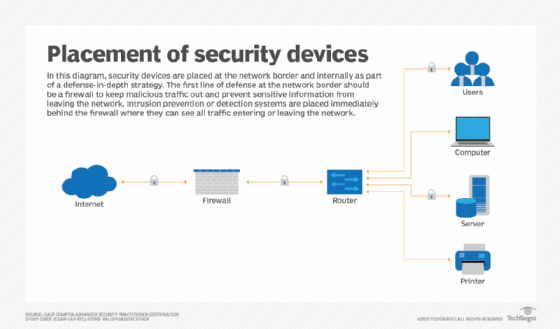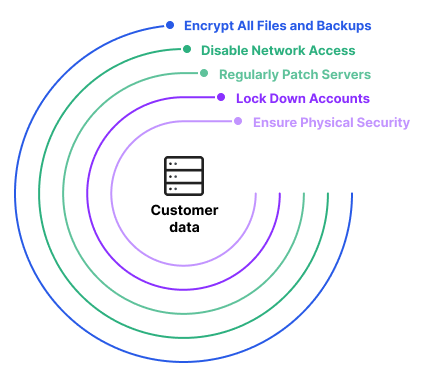Encryption is crucial for protecting sensitive data in modern network security systems. It ensures confidentiality, integrity, and authenticity of information.
Importance of Encryption Shielding Digital Realms:In today’s digital landscape, data breaches and cyber threats are rampant. Organizations face constant challenges in safeguarding sensitive information. Encryption serves as a robust defense mechanism against unauthorized access and data theft. By converting data into unreadable formats, encryption ensures that only authorized users can access the information.
As businesses increasingly rely on cloud services and remote access, the importance of encryption grows. It protects not just personal data but also critical business information. Adopting strong encryption practices is essential for building trust with customers and partners. Ultimately, encryption plays a pivotal role in maintaining a secure network environment.

Credit: www.techtarget.com
The Rise Of Digital Security Needs
As technology advances, the need for digital security grows. Protecting sensitive data is crucial. Cyber threats continue to evolve, targeting businesses and individuals alike. Encryption plays a key role in safeguarding information.
Evolving Cyber Threat Landscape
Cyber threats are becoming more sophisticated. Here are some common types:
- Phishing: Tricks users into sharing personal data.
- Malware: Malicious software that damages systems.
- Ransomware: Blocks access to data until a ransom is paid.
Organizations face various challenges:
| Challenge | Impact |
|---|---|
| Data Breaches | Loss of sensitive information. |
| Identity Theft | Financial losses and reputational damage. |
| Compliance Issues | Fines and legal consequences. |
Encryption helps combat these threats. It secures data in transit and at rest. This makes unauthorized access difficult.
Shift To Digital Economies
The global economy is rapidly moving online. Businesses rely on digital transactions. Consumers expect secure online experiences.
Benefits of encryption in digital economies include:
- Data Protection: Keeps sensitive information safe.
- Trust Building: Increases customer confidence.
- Regulatory Compliance: Meets legal standards.
Organizations must adopt encryption strategies. This ensures data integrity and confidentiality. By prioritizing encryption, businesses can thrive in the digital age.
Basics Of Encryption Technology
Encryption is vital in protecting information. It transforms data into a secure format. Only authorized users can access this data. Understanding the basics of encryption helps improve network security.
How Encryption Works
Encryption uses algorithms to secure data. Here’s a simple breakdown:
- Plaintext: This is the original data.
- Encryption Algorithm: This converts plaintext into ciphertext.
- Ciphertext: This is the scrambled data.
- Decryption: This process converts ciphertext back to plaintext.
Encryption keys play a key role. They are used in both encryption and decryption. The longer the key, the harder it is to crack.
Types Of Encryption
There are two main types of encryption:
| Type | Description |
|---|---|
| Symmetric Encryption | Uses the same key for encryption and decryption. |
| Asymmetric Encryption | Uses a pair of keys: a public key and a private key. |
Each type serves different needs:
- Symmetric Encryption: Faster and less complex.
- Asymmetric Encryption: More secure for sharing keys.
Choosing the right type depends on your security requirements.
Encryption As A Privacy Tool
Encryption plays a vital role in protecting user privacy. It safeguards sensitive information from unauthorized access. In a world full of data breaches, encryption is essential. It transforms readable data into a secure format. Only authorized users can decode this information.
Protecting Personal Data
Personal data is at risk every day. Hackers target this data for various reasons. Encrypting personal information is crucial for safety. Here are some key benefits:
- Data Security: Encryption keeps data safe from cybercriminals.
- Identity Protection: It helps shield personal identities.
- Regulatory Compliance: Many laws require data encryption.
Common types of personal data needing protection include:
- Social Security Numbers
- Bank Account Information
- Medical Records
Impact On User Confidentiality
User confidentiality is paramount in the digital age. Encryption enhances this confidentiality significantly. It ensures that only authorized individuals access sensitive information.
Consider the following impacts:
| Impact | Description |
|---|---|
| Trust Building | Users trust services that prioritize their privacy. |
| Data Integrity | Encryption helps maintain accurate and trustworthy data. |
| Reduced Risk | Encryption lowers the chances of data breaches. |
Encrypting data fosters a sense of security. Users feel safe sharing their information. This trust is essential for any online service.
Economic Implications Of Encryption
Encryption plays a vital role in modern economies. It protects sensitive data and builds trust. Businesses rely on encryption to secure transactions and customer information. This trust leads to increased revenue and growth.
Safeguarding E-commerce
E-commerce thrives on trust. Encryption ensures safe online shopping. It protects customer data from hackers.
- Secure payment transactions
- Protection of personal information
- Prevention of data breaches
With encryption, consumers feel safe buying online. This safety leads to:
- Increased sales
- Higher customer retention
- Greater brand loyalty
Benefits For The Tech Industry
The tech industry benefits significantly from encryption. It fosters innovation and development. Companies invest in secure technologies.
| Benefit | Description |
|---|---|
| Data Security | Protects sensitive information from unauthorized access. |
| Regulatory Compliance | Meets legal requirements for data protection. |
| Competitive Advantage | Companies stand out by offering secure solutions. |
Encryption leads to a more secure tech landscape. It encourages investment and boosts economic growth.
National Security And Encryption
Encryption plays a crucial role in protecting national security. It safeguards sensitive information from unauthorized access. Governments rely on encryption to defend against cyber threats. Strong encryption ensures that vital data remains confidential and secure.
Role In Government Defense Strategies
Government defense strategies heavily depend on encryption. It helps protect military communications and operations. Below are key aspects of encryption in defense:
- Secure Communication: Encryption keeps messages private among military personnel.
- Data Protection: Sensitive defense data is secured from cyber attacks.
- Operational Integrity: Ensures the integrity of strategic plans.
These strategies form a vital part of national security. Governments invest in advanced encryption methods. This investment helps combat evolving cyber threats.
Encryption In Intelligence Operations
Intelligence agencies use encryption to protect classified information. It is essential for national security. Here are some critical roles of encryption in intelligence:
- Secure Data Transmission: Agents use encrypted channels for communication.
- Information Integrity: Encryption ensures data is not altered or tampered with.
- Confidentiality: Protects identities of operatives and informants.
Encryption tools help intelligence agencies operate effectively. They prevent adversaries from accessing sensitive data. Strong encryption is essential for national security and intelligence operations.
Legal And Ethical Considerations
Encryption plays a crucial role in protecting data. It raises important legal and ethical questions. Organizations must navigate these issues carefully.
Encryption Policy Debates
The debate around encryption policies is intense. Different groups have varied opinions. Here are key points:
- Privacy Rights: Individuals want to keep their data safe.
- Corporate Security: Businesses rely on encryption to protect sensitive information.
- Government Access: Authorities seek access for national security.
- International Laws: Different countries have different regulations.
These points create a complex environment for lawmakers. Finding a balance between protection and access is challenging.
Balancing Privacy And Law Enforcement
Balancing privacy with law enforcement needs is tricky. Encryption can hinder police investigations. Yet, it is vital for personal security. Key factors include:
- Data Security: Strong encryption protects personal data.
- Public Safety: Law enforcement requires tools to prevent crime.
- Ethical Responsibility: Companies must protect customer privacy.
Striking a balance ensures both safety and privacy. Open discussions can help shape fair policies. Stakeholders must engage in meaningful dialogue.
Challenges In Implementing Encryption
Implementing encryption in modern networks faces several challenges. These barriers can hinder effective security measures. Understanding these challenges helps organizations enhance their security posture.
Technical Barriers
Technical issues often complicate encryption deployment. Here are some key challenges:
- Complexity of Integration: Integrating encryption with existing systems can be difficult.
- Performance Impact: Encryption may slow down network performance.
- Compatibility Issues: Not all systems work well with encryption protocols.
- Key Management: Managing encryption keys can be a logistical nightmare.
Organizations must address these barriers to implement encryption effectively. Proper planning and resources are essential.
User Awareness And Adoption
User awareness plays a crucial role in encryption success. Many users lack basic knowledge about encryption. This leads to poor adoption and misuse. Here are some factors to consider:
- Education: Training users on the importance of encryption is vital.
- Resistance to Change: Users often resist new security measures.
- Usability: Complex encryption tools can deter users from adopting them.
- Trust Issues: Users may not trust the encryption process or technology.
Addressing these issues requires a focus on user education. Enhancing usability can also lead to better adoption.

Credit: www.amazon.com
Future Of Encryption
The future of encryption holds great promise for modern security. As technology evolves, so do threats. Strong encryption will play a vital role in protecting data. Businesses and individuals must stay ahead of these challenges.
Advancements In Cryptography
Cryptography is changing rapidly. Here are some key advancements:
- Post-Quantum Cryptography: Protects against quantum attacks.
- Homomorphic Encryption: Allows computations on encrypted data.
- Blockchain Technology: Enhances data integrity and transparency.
- Zero-Knowledge Proofs: Enables verification without revealing data.
These advancements improve security and privacy. They help organizations protect sensitive information. Users will feel safer in a digital world.
Preparing For Quantum Computing
Quantum computing poses a new challenge. It can break traditional encryption methods. Organizations must prepare for this shift.
Steps to prepare include:
- Adopt post-quantum algorithms.
- Regularly update encryption practices.
- Educate staff about emerging threats.
- Engage with cybersecurity experts.
By preparing now, businesses can stay secure. The time to act is now. Don’t wait for quantum threats to become a reality.

Credit: www.imperva.com
Frequently Asked Questions
What Is Encryption In Network Security?
Encryption is the process of converting data into a secure format. This ensures that only authorized users can access the information. In modern network security systems, encryption protects sensitive data from unauthorized access and cyber threats. It is a crucial element for maintaining confidentiality and integrity.
Why Is Encryption Important For Data Protection?
Encryption is vital for protecting sensitive information from breaches. It safeguards data during transmission and storage, making it unreadable to unauthorized users. In a world where cyber threats are prevalent, encryption provides a significant layer of security. This helps organizations comply with regulations and build trust with users.
How Does Encryption Enhance Privacy Online?
Encryption enhances online privacy by securing personal data. It prevents unauthorized access to communication and sensitive information. When users interact on the internet, encryption ensures that their activities remain confidential. This fosters a safer online environment, making it essential for both individuals and businesses.
What Types Of Encryption Are Commonly Used?
Common types of encryption include symmetric and asymmetric encryption. Symmetric encryption uses the same key for both encryption and decryption. Asymmetric encryption uses a pair of keys, public and private. Each type has its use cases, providing flexibility in securing various types of data.
Conclusion
Encryption plays a vital role in protecting sensitive data from cyber threats. It ensures that information remains confidential and secure during transmission. As businesses increasingly rely on digital communication, strong encryption methods are essential for safeguarding networks. Prioritizing encryption helps build trust and maintain the integrity of modern security systems.




Leave a Reply